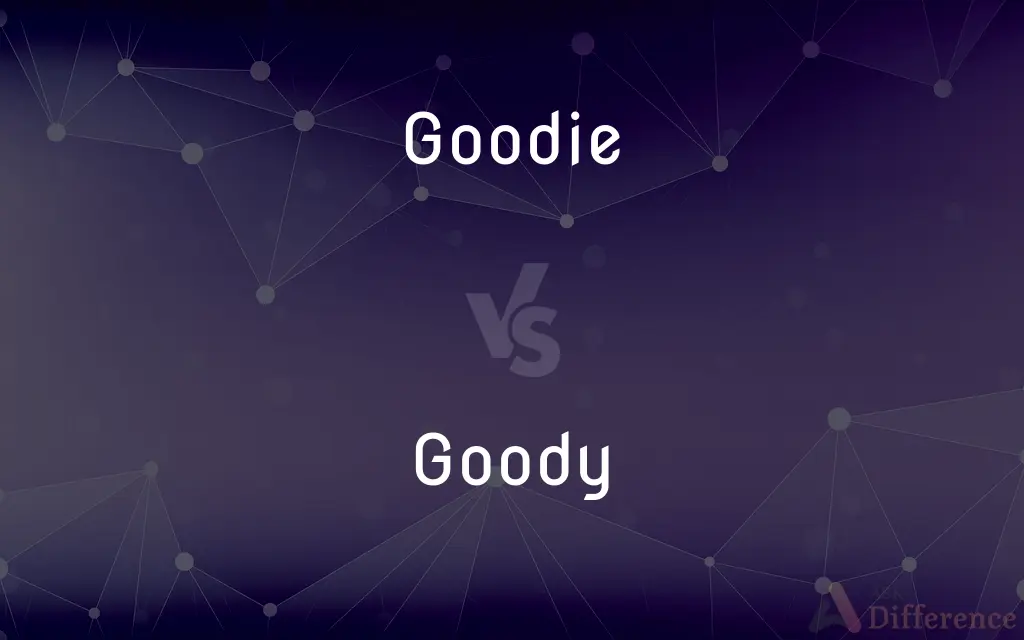Goodie vs. Goody — What's the Difference?
Edited by Tayyaba Rehman — By Urooj Arif — Updated on March 27, 2024
Goodie refers to something desirable or pleasurable, often a sweet treat or a surprise gift, while Goody is an informal term for a virtuous person or used sarcastically to denote someone too virtuous.

Difference Between Goodie and Goody
Table of Contents
ADVERTISEMENT
Key Differences
Goodie, often found in the plural form 'goodies,' typically refers to delightful or desirable items, such as candies, treats, or surprises in a context of pleasure and enjoyment. Goody, on the other hand, can be a diminutive form of 'goodwife,' an archaic term for a married woman, or used to describe someone perceived as excessively virtuous or moralistic, sometimes with a negative connotation.
In contemporary usage, 'goodie' is commonly used to express excitement about receiving or discovering something desirable, such as in a goodie bag at a party. Meanwhile, 'goody' might be used in a more judgmental or mocking tone, implying that someone is acting too good or overly righteous, particularly in informal or colloquial settings.
The term 'goodie' can be associated with children's language or informal adult speech, especially when talking about treats or rewards. 'Goody,' however, carries a more nuanced tone, often employed in discussions about morality, behavior, or in literary contexts to describe a character's overly virtuous nature.
Despite their different connotations, both terms share a root in the word 'good.' While 'goodie' emphasizes the goodness in a tangible, pleasurable sense, 'goody' focuses on the goodness of a person's character, albeit sometimes questioned or mocked.
The evolution of these terms reflects changes in language and culture. 'Goodie' remains a playful and widely understood term for enjoyable items, whereas 'goody' has evolved to have a more complex, often ironic usage, illustrating the versatility and depth of language in capturing human attitudes and behaviors.
ADVERTISEMENT
Comparison Chart
Meaning
Something desirable or pleasurable, often treats.
A virtuous person, sometimes used sarcastically.
Usage Context
Informal, often related to treats or rewards.
Informal, can imply excessive virtue or sarcasm.
Connotation
Positive, associated with pleasure and surprise.
Can be negative, implying pretentious virtue.
Common Form
Often used in the plural 'goodies.'
Used both as a noun and an adjective.
Origin
From 'good,' relating to desirable items.
Diminutive of 'goodwife,' evolved to mean overly virtuous.
Compare with Definitions
Goodie
A desirable or pleasurable item, often a sweet treat.
The children eagerly awaited the goodies at the birthday party.
Goody
Informal term for a person who is excessively virtuous.
She was often teased for being a goody two-shoes in school.
Goodie
Something considered a bonus or extra surprise.
Inside the package were several goodies, including stickers and keychains.
Goody
Used sarcastically to describe someone pretending to be virtuous.
Oh, aren't you the goody-goody, always doing the right thing.
Goodie
Rewards or treats, especially in a promotional context.
The company sent a box of goodies to thank their clients.
Goody
A term of endearment for a good, kind person.
Grandma is such a goody, always baking cookies for us.
Goodie
Items of interest or value in a collection.
The collector found several goodies at the antique store.
Goody
In historical contexts, a respectful address for a woman, short for 'goodwife.'
Goody Proctor was a notable character in the play about the Salem witch trials.
Goodie
Pleasurable experiences or events.
The vacation was full of goodies, from beach days to gourmet dinners.
Goody
A character in literature or media known for their virtuousness.
The story's goody was too perfect, lacking depth and complexity.
Goodie
Variant of goody1.
Goody
Used to express delight.
Goodie
Expression of pleasure; yippee.
Goody
Something attractive or delectable, especially something sweet to eat.
Goodie
(informal) A good character in a story, often a hero.
Goody
A goodwife.
Goodie
Alternative form of goody
Goody
(informal) Used to indicate pleasure or delight.
Goody
(informal) A small amount of something good to eat.
Goody
(informal) Any small, usually free, item.
Goody
(Ireland) Pudding made by boiling bread in milk with sugar and spices.
Goody
(informal) hero, good character in a story
Goody
That which is good, the good part of something, which one desires to extract or use up.
Goody
An American fish, the lafayette or spot.
Goody
(obsolete) Goodwife, a 17th-century puritan honorific for an adult woman.
Goody
Synonym of goody-goody
Goody
A bonbon, cake, or the like; - usually in the pl.
Goody
An American fish; the lafayette or spot.
Goody
Goodwife; - a low term of civility or sport.
Goody
Weakly or sentimentally good; affectedly good; - often in the reduplicated form goody-goody.
Goody
Something considered choice to eat
Common Curiosities
Is "goodie" only related to food items?
While "goodie" often refers to edible treats, it can also relate to any desirable item or experience, not limited to food.
What makes a "goodie" desirable?
A "goodie" is desirable because it brings pleasure, surprise, or value to the recipient, often in the form of treats or unexpected gifts.
Can "goodie" be used in a negative way?
"Goodie" typically has a positive connotation, associated with pleasure and enjoyment, and is not commonly used negatively.
Why might someone be called a "goody"?
Someone might be called a "goody" if they are perceived as overly righteous or virtuous, often in a context where such virtue is seen as pretentious or insincere.
What does "goodie" typically refer to?
Goodie usually refers to something desirable or pleasurable, like a sweet treat or a special surprise.
How can "goody" be used positively?
"Goody" can be used positively as a term of endearment for someone genuinely kind and good-hearted.
Are "goodie bags" only for children?
Goodie bags are popular at children's parties, but they can also be for adults, often filled with treats or promotional items at events.
How do cultural perceptions affect the use of "goody"?
Cultural perceptions of virtue and morality can influence the use of "goody," especially when virtue is viewed skeptically or as a facade.
How is "goody" used in modern language?
Goody is often used to describe someone who is perceived as excessively virtuous, sometimes with a sarcastic or mocking tone.
Why might "goody" be considered a negative label?
"Goody" can be seen as negative when it implies that someone's virtuous behavior is overdone, insincere, or annoying to others.
What is the origin of "goody" as a term?
"Goody" originated as a diminutive form of "goodwife," an archaic term for a married woman, and evolved to describe someone overly virtuous.
Is there a difference in usage between "goodie" and "goody"?
Yes, "goodie" is generally used in a positive context to describe desirable items or experiences, while "goody" can have a more nuanced or sarcastic usage related to virtue.
Can "goody" refer to a specific type of character in literature?
Yes, "goody" can describe a character in literature or media who is notably virtuous, sometimes to the point of lacking complexity or realism.
What role do "goodies" play in social events?
"Goodies" often add excitement and enjoyment to social events, serving as treats or souvenirs for guests.
How has the meaning of "goodie" evolved over time?
The meaning of "goodie" has remained relatively stable, consistently denoting something pleasurable or desirable, though its applications may vary.
Share Your Discovery

Previous Comparison
Interactional vs. Interactive
Next Comparison
Primarily vs. PrimaryAuthor Spotlight
Written by
Urooj ArifUrooj is a skilled content writer at Ask Difference, known for her exceptional ability to simplify complex topics into engaging and informative content. With a passion for research and a flair for clear, concise writing, she consistently delivers articles that resonate with our diverse audience.
Edited by
Tayyaba RehmanTayyaba Rehman is a distinguished writer, currently serving as a primary contributor to askdifference.com. As a researcher in semantics and etymology, Tayyaba's passion for the complexity of languages and their distinctions has found a perfect home on the platform. Tayyaba delves into the intricacies of language, distinguishing between commonly confused words and phrases, thereby providing clarity for readers worldwide.
















































